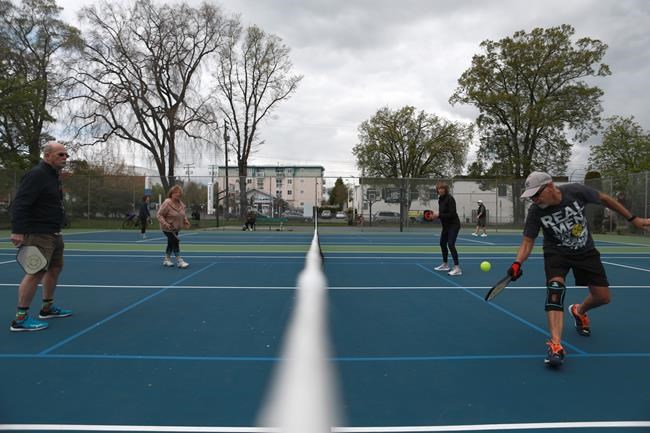Halifax city council could close pickleball court due to ‘excessive’ noise
By Cassidy McMackon, The Canadian Press on December 13, 2024.
 People play a game of pickleball in Victoria, B.C., on April 28, 2022. A pickleball court in a Halifax suburb is one step closer to being shut down by the Halifax Regional Municipality after drawing several complaints from residents who describe the noise levels as "excessive." THE CANADIAN PRESS/Chad Hipolito
People play a game of pickleball in Victoria, B.C., on April 28, 2022. A pickleball court in a Halifax suburb is one step closer to being shut down by the Halifax Regional Municipality after drawing several complaints from residents who describe the noise levels as "excessive." THE CANADIAN PRESS/Chad HipolitoHALIFAX – Pickleball courts in a Halifax suburb are in danger of being shut down by the city after drawing complaints from residents who describe the noise levels as “excessive.”
The Halifax Regional Municipality’s community planning and economic development committee voted Thursday to convert a set of pickleball courts in Castle Hill Park back into tennis courts while seeking out more appropriate pickleball sites elsewhere in the municipality.
Coun. Kathryn Morse said she brought a motion forward after receiving complaints from people in her district who “couldn’t stand the noise” generated from people playing pickleball just 10 metres from a condo complex.
“It was echoing into the nearby houses and condominiums,” Morse said in an interview Friday, adding the problem in the park is particular because the noise is essentially in people’s backyards.
Pickleball is like tennis but is played on a smaller court where players hit a small, perforated ball that makes a sharp, popping noise when hit with a paddle. The sport has exploded in popularity across North America, prompting noise complaints from residents in several areas.
A presentation by city staff to the committee Thursday said the city has tried several things to prevent excessive noise, including enforcing hours when pickleball could be played and requiring players to use a foam ball instead of the traditional hard, plastic ball.
Morse said there wasn’t a lot of compliance from players and noise complaints persisted. She said the municipal council will have the final say when it votes in either January or February on whether to convert the courts back to tennis.
A study completed by municipal staff says Halifax should follow Vancouver’s approach to pickleball, adopted after lawsuits were filed against the city in 2021 and 2022 for excessive pickleball noise.
The Halifax report says that under the Vancouver model, pickleball courts are required to be evenly distributed throughout the city and use appropriate sound barriers to keep noise levels below 50 decibels.
This report by The Canadian Press was first published Dec. 13, 2024.
11-10


